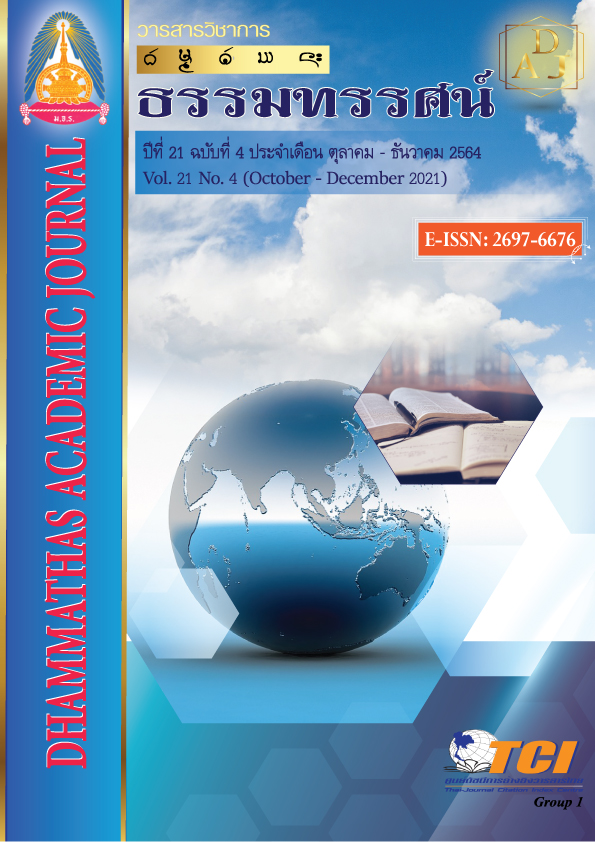Developing Computational Thinking using STEM-Problem Based Learning in Momentum and Collisions Topic for 10th Grade Students
Main Article Content
Abstract
This research aimed to study the results of computational thinking development using problem-based learning management based on STEM education concept on momentum and collisions for Mathayomsuksa 4 students, 2nd semester of the academic year 2020, which was consisted of 40 participants. The research instruments were: 1) problem-based learning management based on the STEM study concept lesson plan, 2) computational thinking measurement model, 3) learning activity work sheet. The researcher performed the qualitative data analysis through the content and quantitative analysis using the percentage scores.
The results of the research were as follow: The results before the study occurred, during the study and after the study using problem-based learning management based on the STEM concept. There was a trend of continuous improvement in computational thinking and the overall development of students' computational thinking was at a good level. When the results of the development of computational thinking in each component were studied, it was found that algorithm was least developed one while the abstraction was the most developed one.
Article Details
References
ทวิช มณีพนา. (2563). การพัฒนาชุดการทดลองวิทยาศาสตร์เรื่องเสียง เพื่อส่งเสริมความเข้าใจแนวคิดทางวิทยาศาสตร์และการคิดเชิงคำนวณ ของนักเรียนระดับชั้นมัธยมศึกษาตอนปลาย. (ปริญญานิพนธ์การศึกษาดุษฎีบัณฑิต). กรุงเทพฯ: มหาวิทยาลัยศรีนครินทรวิโรฒ.
ภาสกร เรืองรอง. (2561). Computational Thinking กับการศึกษาไทย. วารสารปัญญาภิวัฒน์, 10(3), 322-330.
ศรายุทธ ดวงจันทร์. (2561). ผลการใช้แนวสะเต็มศึกษาในวิชาฟิสิกส์ที่มีต่อความสามารถในการคิดเชิงคำนวณของนักเรียนมัธยมศึกษาตอนปลาย. (วิทยานิพนธ์ปริญญาครุศาสตรมหาบัณฑิต). กรุงเทพฯ: จุฬาลงกรณ์มหาวิทยาลัย.
สถาบันส่งเสริมการสอนวิทยาศาสตร์และเทคโนโลยี. (2560ข). คู่มือการใช้หลักสูตรรายวิชาพื้นฐานวิทยาศาสตร์ กลุ่มสาระการเรียนรู้วิทยาศาสตร์ (ฉบับปรับปรุง พ.ศ. 2560) ระดับประถมศึกษาและมัธยมศึกษา. กรุงเทพฯ: สถาบันส่งเสริมการสอนวิทยาศาสตร์และเทคโนโลยี.
สำนักงานเลขาธิการสภาการศึกษา. (2560). แผนการศึกษาแห่งชาติ พ.ศ. 2560-2579. กรุงเทพฯ: พริกหวานกราฟฟิค.
Brackmann, C., et al. (2017). Development of Computational Thinking Skills through Unplugged Activities in Primary School. The 12th Workshop on Primary and Secondary Computing Education (WiPSCE 2017), (pp. 65-72). Nijmegen, Netherlands: Institute for Computing and Information Sciences, Radboud University.
Dwyer, H., et al. (2013). Computational Thinking for Physics: Programming Models of Physics Phenomenon in Elementary School. Physics Education Research Conference 2013, 133-136.
Lou, S. J., et al. (2011). The impact of problem-based learning strategies on STEM knowledge integration and attitudes: An exploratory study among female Taiwanese senior high school students. Journal of Technology and Design Education, 10798(21), 195-215.
McKenna, J. (2017). Computational thinking in STEM classroom. Retrieved from https://robomatter.com/blog-ct-in-stem-classroom/

